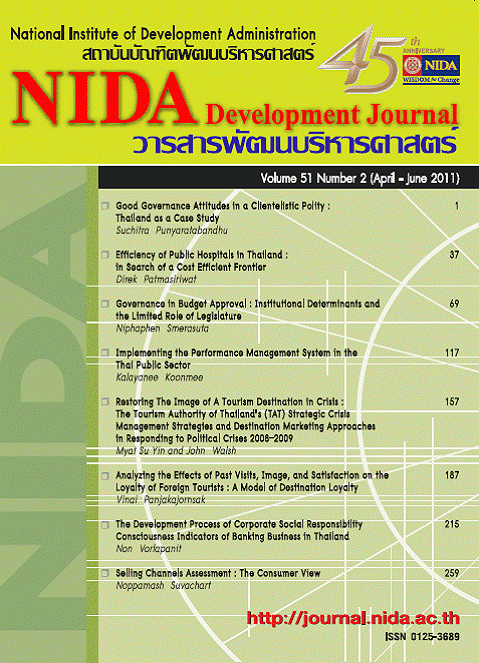Implementing the Performance Management System in the Thai Public Sector การดำเนินการระบบการบริหาร ผลการปฏิบัติงานในภาคราชการไทย
Abstract
The Public Sector Development Commission implemented a performance management system comprised of goal setting, performance appraisal, and incentives for performance in the Thai public sector in 2004. The ultimate objective was to improve the ability and standards of Thai public services and to continually improve the efficiency of Thai public officers. This study aims to investigate the effects of this performance management system during the period 2004-2007, and to provide some recommendations on how to improve the system. The data collection includes primary data obtained from a survey by questionnaire. There are two groups of respondents: executives and staff. They were stratified using multi-stage sampling, with a 37.1% response rate from executives and 54.7% from staff. The findings are: 1) All three components of the performance management system, i.e. goal setting, performance appraisal, and incentive allocation, had a significant effect on the efficiency and effectiveness of both agencies and individuals. The effect on agencies was higher than the effect on individuals. 2) Among the three components of the performance management system, performance agreement and performance appraisal had about the same effect. This effect was higher than the effect of performance-based pay on efficiency and effectiveness for both agencies and individuals. 3) There were some differences among different units and groups of respondents. Some management recommendations are also included.
คณะกรรมการพัฒนาระบบราชการได้นำระบบการบริหารผลการปฏิบัติงานซึ่งประกอบด้วยการจัดทำคำรับรองการปฏิบัติงาน การติดตามประเมินผลการปฏิบัติงาน และการจัดสรรสิ่งจูงใจตามผลการปฏิบัติงาน มาใช้ในภาคราชการไทยตั้งแต่ปี พ.ศ. 2547 โดยมีวัตถุประสงค์เพื่อปรับปรุงความสามารถและมาตรฐานของหน่วยงานราชการไทยและเพื่อปรับปรุงประสิทธิภาพในการทำงานของข้าราชการไทยอย่างต่อเนื่อง การศึกษาครั้งนี้มุ่งค้นคว้าผลกระทบของระบบการบริหารผลการปฏิบัติงานนี้ในช่วงปี พ.ศ. 2547-2551 รวมทั้งให้ข้อแนะนำบางประการเพื่อการปรับปรุงระบบงาน การเก็บรวบรวมข้อมูลได้ครอบคลุมถึงข้อมูลปฐมภูมิที่ได้จากการสำรวจด้วยแบบสอบถาม โดยมีกลุ่มตัวอย่างอยู่ 2 กลุ่มด้วยกันคือ กลุ่มผู้บริหารและกลุ่มข้าราชการและลูกจ้างประจำ โดยการเก็บข้อมูลดำเนินการแบบการสุ่มตัวอย่างหลายชั้น ซึ่งได้อัตราตอบกลับจากผู้บริหารเป็น 37.1% และ 54.7% จากกลุ่มข้าราชการและลูกจ้างประจำ ผลการศึกษาพบว่า 1) องค์ประกอบทั้งสามของระบบการบริหารผลการปฏิบัติงาน อันได้แก่ การจัดทำคำรับรองการปฏิบัติราชการการติดตามประเมินผลการปฏิบัติราชการ และการจัดสรรสิ่งจูงใจตามผลการปฏิบัติราชการ ส่งผลกระทบอย่างมีนัยสำคัญต่อประสิทธิภาพและประสิทธิผลของหน่วยงานและบุคลากร โดยผลกระทบต่อระดับหน่วยงานสูงกว่าผลกระทบระดับบุคคล 2) ในองค์ประกอบทั้งสามของระบบการบริหารผลการปฏิบัติงาน การจัดทำคำรับรองการปฏิบัติราชการและการติดตามประเมินผลการปฏิบัติราชการส่งผลกระทบด้วยระดับที่ใกล้เคียงกันต่อประสิทธิภาพและประสิทธิผลในการปฏิบัติราชการของหน่วยงานและบุคลากร ซึ่งผลกระทบนี้สูงกว่าผลกระทบจากการจัดสรรสิ่งจูงใจตามผลการปฏิบัติราชการ และ 3) มีความแตกต่างกันบ้างสำหรับผลการศึกษาที่แจกแจงลงรายละเอียดตามกลุ่มหน่วยงานและกลุ่มบุคคล นอกจากนั้นผู้วิจัยได้เพิ่มเติมข้อเสนอแนะด้านการบริหารบางประการไว้ด้วย





